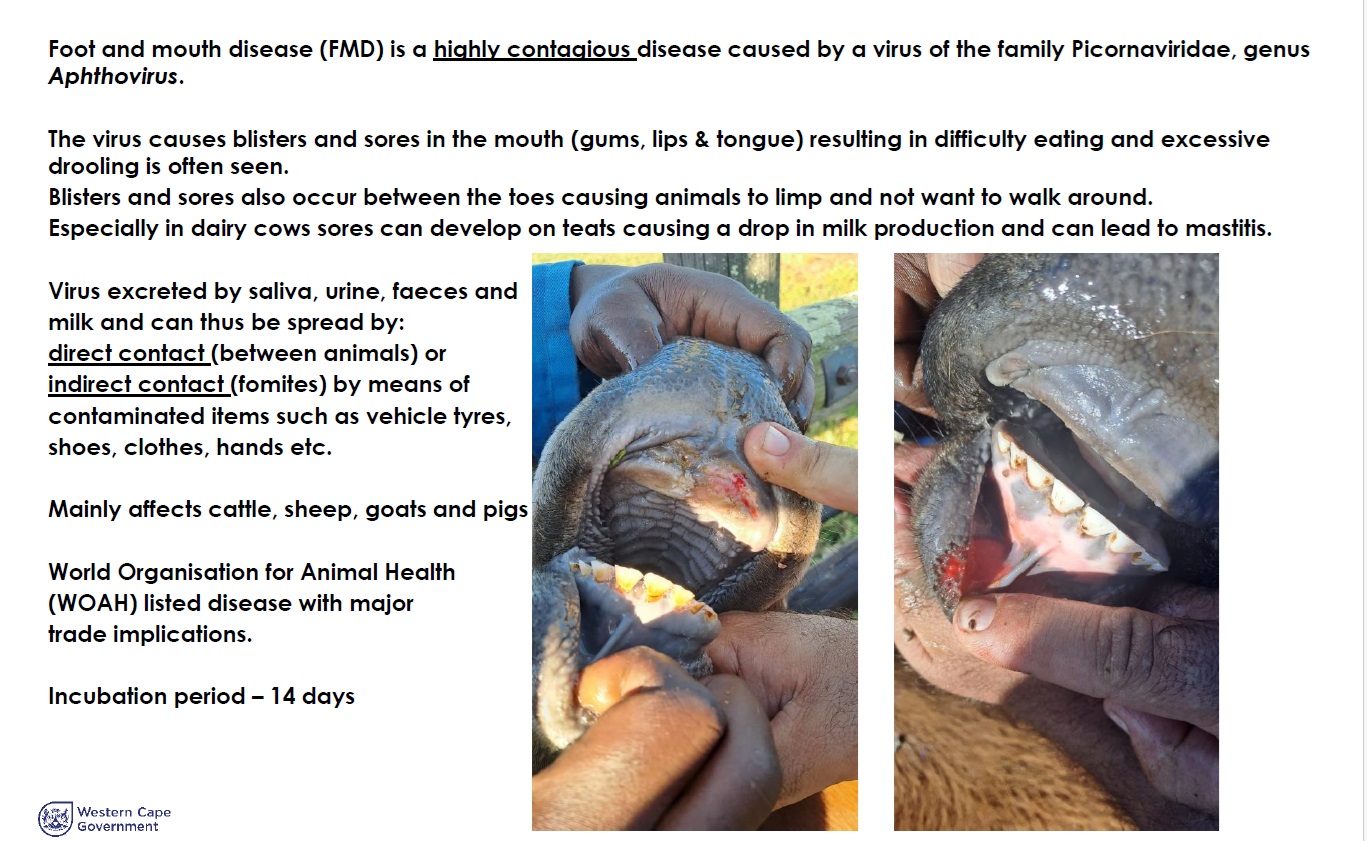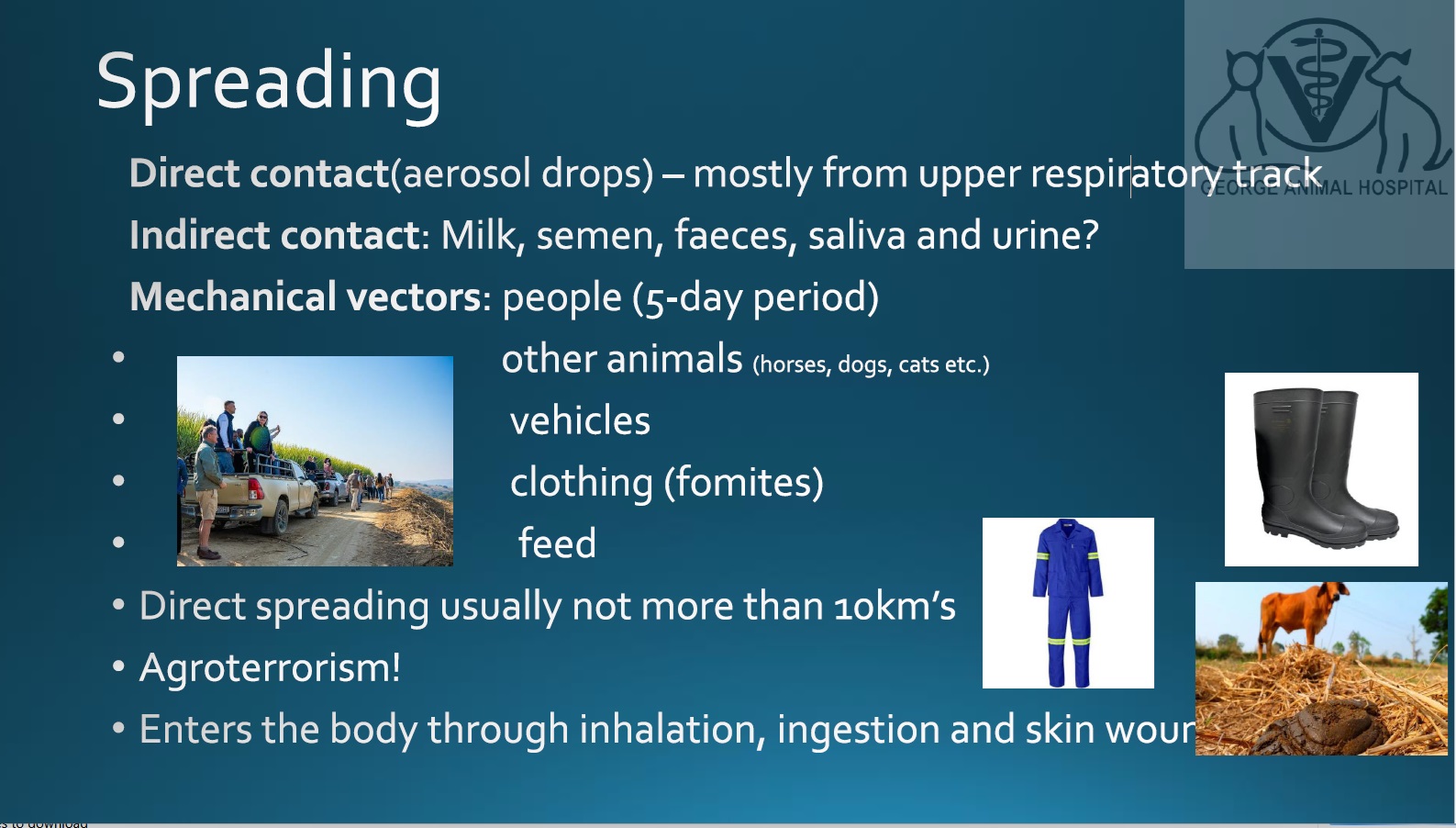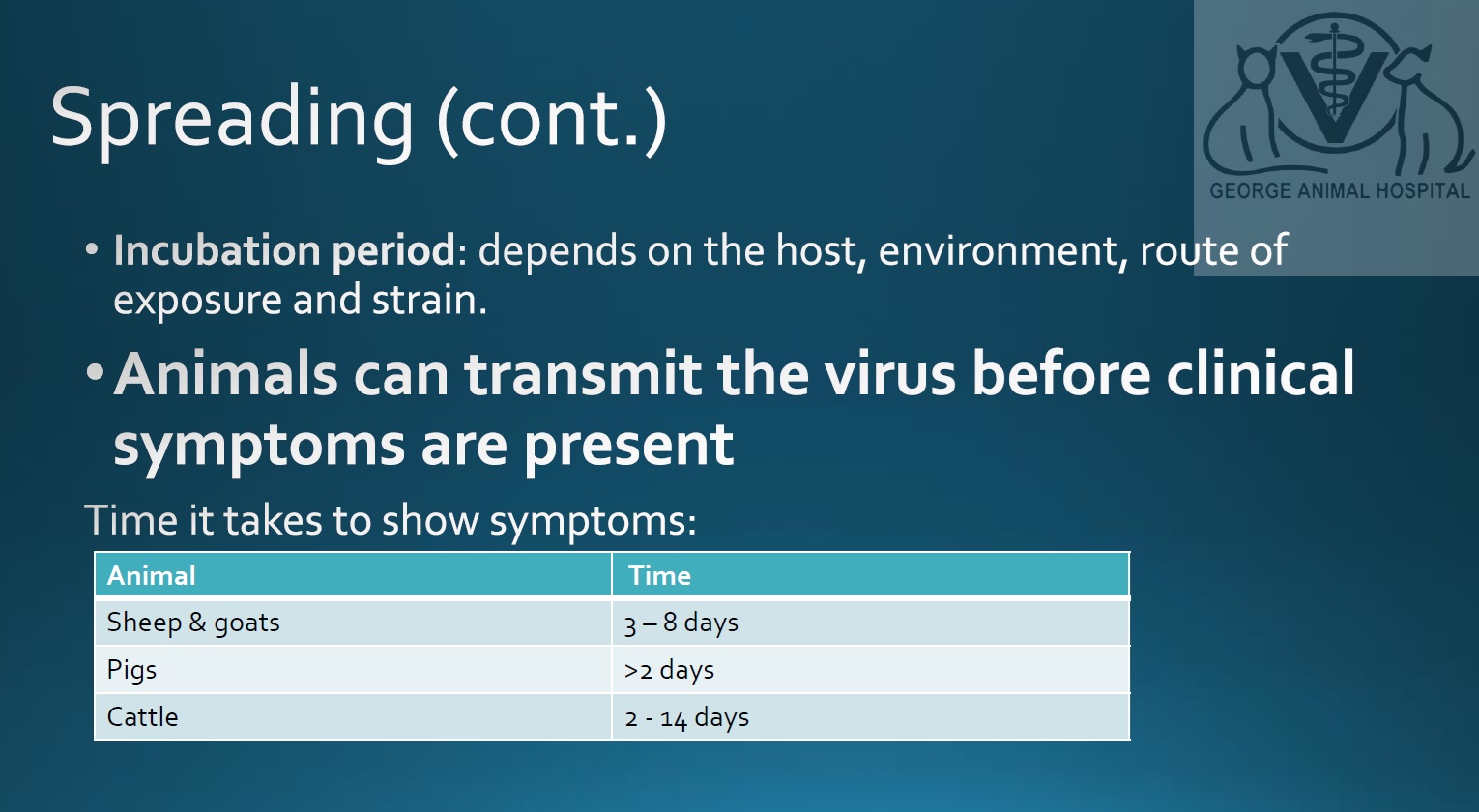GARDEN ROUTE NEWS - In a joint effort, veterinarians and farmers from the Southern Cape have taken the lead in the Western Cape to urge the provincial government to introduce formal control measures to prevent the spread of foot-and-mouth disease (FMD) over local borders into the province.
This was done through a formal proposal setting out the measures that are critically needed to keep the province FMD-free. The Western and Northern Cape are currently the only FMD-free provinces in South Africa, and the movement of animals and animal products poses a constant risk.
The proposal was handed over to Dr Noluvuyo Magadla, Director of Animal Health at the State Veterinary Services for the Western Cape Agriculture Department, during an FMD farmers’ day at the George Showgrounds on Wednesday 8 October.
The event was initiated and hosted by the George Animal Clinic in collaboration with a group of local farmers and various farmer organisations.
Dr Muller Strydom of the clinic said the lack of protective controls and co-ordination for FMD prevention in the province is alarming. FMD has serious consequences for food security and rural employment in the long term. Once it is introduced into an area, domestic and export markets are immediately closed and beef, dairy, sheep and pig producers suffer severe financial losses.
“Our proposal recommends a proactive, province-wide strategy to strengthen biosecurity, surveillance and emergency preparedness,” said Strydom.
Vaccine availability and JOCs at district municipal level
In the proposal, the farmers requested that a secured quantity of vaccine always be on standby at provincial facilities to be immediately available in the event of an outbreak in a dairy-producing area. Dairy cattle are most severely affected.
The proposal states that scenario planning must be done in conjunction with state vets, and regional teams should be established that must include animal health technicians familiar with biosecurity protocol for FMD.
Joint operation committees (JOCs) at district municipality level must also be established and veterinary staff should be trained in outbreak containment and field diagnostics.
 Farmer André Barnard and AgriSA's regional representative for the Southern Cape, Henry Meyer were among the attendees.
Farmer André Barnard and AgriSA's regional representative for the Southern Cape, Henry Meyer were among the attendees.
Signboards at entry routes
Other recommendations are to erect relevant signboards at all entry routes into the Western Cape, establish veterinary checkpoints on high-risk entry routes and introduce compulsory movement permits that are nationally standardised. The SAPS, provincial traffic and local law enforcement officials must also be empowered to stop vehicles and check that the necessary permits are correct.
342 outbreaks
Southern Cape state vet Dr Leana Janse van Rensburg said in an update of the spread of the disease that as of 22 September, 342 outbreaks had been recorded since the start of the year, the most of which were in KwaZulu-Natal - 200 outbreaks.
FMD is a highly contagious viral disease that causes blisters and sores in the mouth, resulting in difficulty eating and excessive drooling. Blisters and sores also occur between the toes, causing animals to limp.
 An excerpt from Southern Cape state vet Dr Leana Janse van Rensburg's presentation.
An excerpt from Southern Cape state vet Dr Leana Janse van Rensburg's presentation.
Dairy cattle suffer most
According to Dr Anthony Davies of the Humansdorp Vet Clinic, dairy cattle suffer the most due to excruciatingly painful symptoms that are emotionally traumatic to witness. Dairy farms also suffer greater financial losses than those with other cloven-hoofed livestock. Davies said where FMD breaks out, the whole community is affected.
The crushing impact of the disease was also described by Elouise Hattingh, a biosecurity practitioner of BKB, through the story of an Eastern Cape dairy farmer whose R40m farming operation was, in his own words, rendered worthless overnight when FMD was diagnosed in his herd. They said the way out of such a situation is arduous and requires grit and patience, and can take several years.
Illegal movement
During a question-and-answer session, various farmers aired serious concerns over the lack of control and co-ordination in the Southern Cape area. Incidents of undetected illegal movement of animals at night are being suspected.
A local SAPS officer said police members are at a loss as to the required protocols in the event of encountering a suspicious-looking livestock transporter.
 Elouise Hattingh, biosecurity practitioner for BKB who develops biosecurity plans for individual farms.
Elouise Hattingh, biosecurity practitioner for BKB who develops biosecurity plans for individual farms.

 The two slides above are from George Animal Clinic's Dr Muller Strydom's presentation that was titled, 'Know the enemy' and included an overview of the risks, symptoms and spread of FMD.
The two slides above are from George Animal Clinic's Dr Muller Strydom's presentation that was titled, 'Know the enemy' and included an overview of the risks, symptoms and spread of FMD.
'Onderstepoort failure now a national risk' - Saai
The Southern African Agri Initiative (Saai), an agricultural interest network for farmers, says the latest Onderstepoort Biological Products (OBP) 2024/25 Annual Performance Report, presented before the Portfolio Committee on Agriculture this week, confirms the collapse of South Africa’s state-owned vaccine producer.
In a statement on 14 October, Saai points out that OBP achieved only 62% of its targets, missed R100m in expected revenue, and again received a qualified audit opinion with four unresolved findings. Its profit declined from R231m in 2023/24 to R186m in 2024/25, while vaccine production dropped by 24%.
“This translates into fewer vaccines, weaker disease control and more livestock losses for farmers already under pressure from the ongoing foot-and-mouth disease crisis,” the statement reads.
“It is unacceptable that the Department of Agriculture continues to shield OBP from accountability while South Africa’s livestock industry collapses under preventable disease outbreaks. The department’s oversight failures are now a national risk, threatening both food security and economic stability.”
Saai says OBP has been crippled by weak governance, outdated infrastructure, and leadership instability. "The entity still has no permanent CEO or CFO and remains without Good Manufacturing Practice (GMP) certification." Critical equipment acquired in 2018 has not been used yet.
"The state’s inability to produce and distribute essential vaccines has left rural economies vulnerable and export bans in place, costing the agricultural sector billions."
Saai calls for the appointment of competent leadership at OBP, an independent review of its operations and production capacity, and serious consideration of public–private partnerships or partial privatisation to restore efficiency and accountability.
"Parliament must launch an inquiry into the Department of Agriculture’s handling of OBP, its repeated audit failures, and the resulting breakdown in animal health protection.
"Saai will continue to engage Parliament, the Auditor-General, and agricultural partners to demand urgent reform that restores vaccine security and protects the livelihoods of South African farmers.
‘We bring you the latest Garden Route, Hessequa, Karoo news’
















